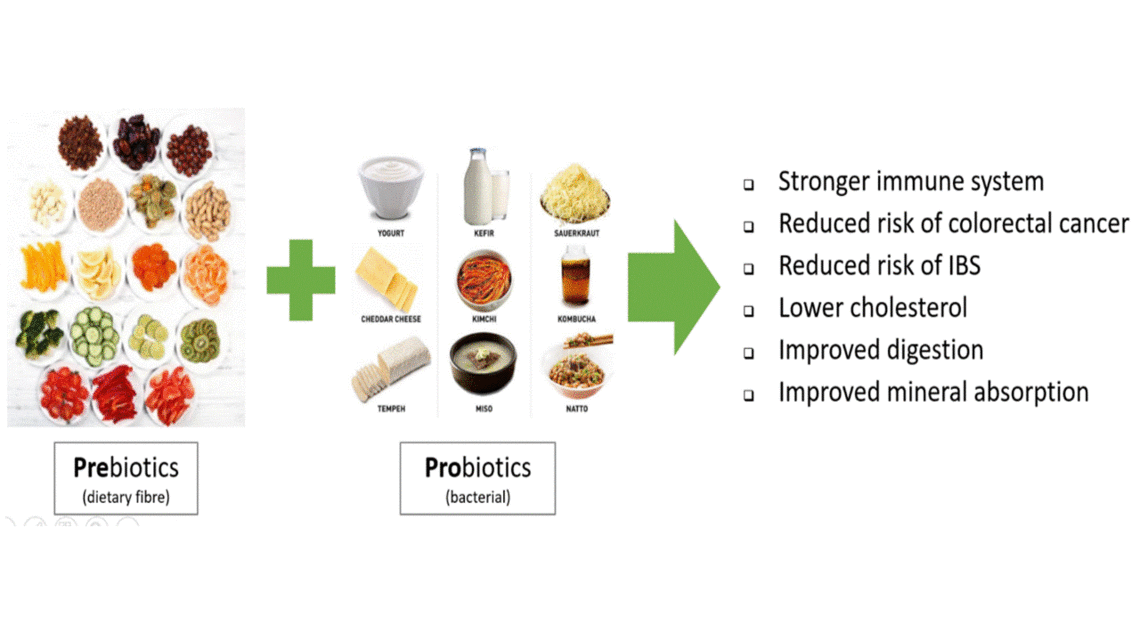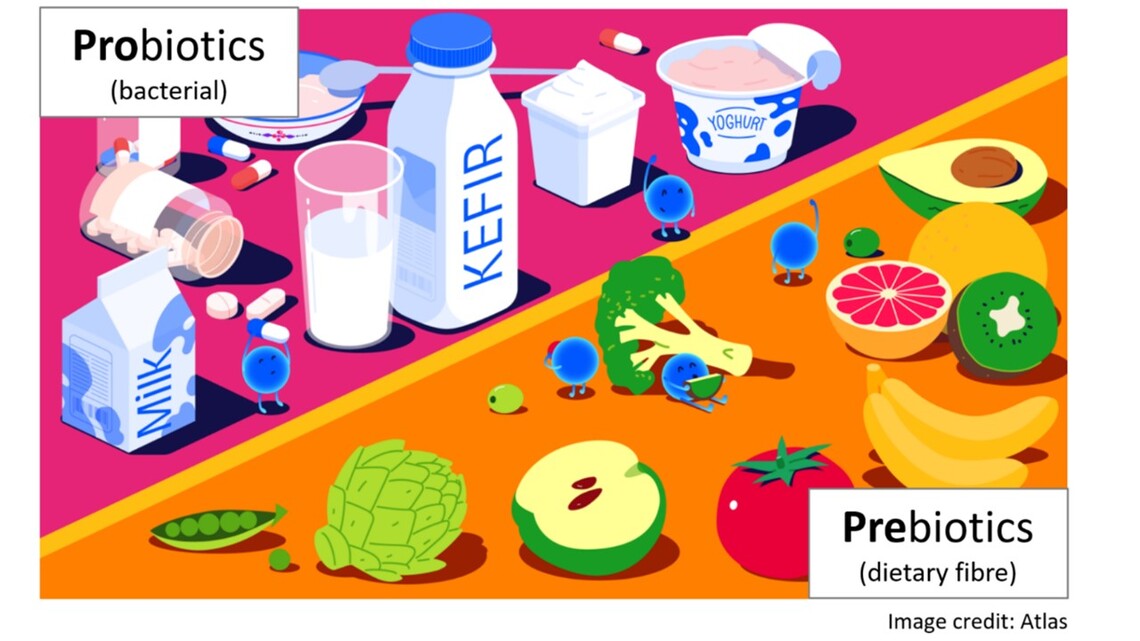Are prebiotics good for our health?
- What are the differences between prebiotics and probiotics?
- How can prebiotics help protect us?
- Health benefits of prebiotics and probiotics
- Could prebiotics help prevent obesity?
- Could prebiotics help prevent type 2 diabetes?
- How much fibre should we eat?
- Prebiotics in context
- Conclusions
We used to think of bacteria as bad for us. However, it seems that some bacteria are 'friendly' and good for our health, and that, in general, the greater the diversity of bacteria in our gut the better. Prebiotics can help encourage the growth of 'friendly' bacteria – hence our interest in them.
What are the differences between probiotics and prebiotics?
Briefly, probiotics are bacteria, and prebiotics are dietary fibre (commonly called ‘roughage’) found in a number of plants.
Probiotics are ‘friendly’ live bacteria in foods like some yoghurts, dairy products, and kimchi and sauerkraut (both are fermented cabbage). Multi-strain probiotics appear to be effective in helping manage some gastrointestinal conditions, such as irritable bowel syndrome (IBS).
In contrast, prebiotics aren't live bacteria; they are dietary fibre found in a number of plants such as bananas, garlic, onions, artichoke, chicory root, beans, peas, whole grains and apple skins.
Prebiotics nourish the growth of the ‘good’ bacteria in our lower gut and in the large bowel. Unlike probiotics, prebiotics aren’t vulnerable to stomach acid, so they can make it through to where they are needed.
|
Prebiotics are food for probiotic bacteria. |
The benefits of probiotics tend to be limited when compared with prebiotics. This is because:
- Different probiotics have different strains and concentrations of bacteria which have different properties. Although more probiotics are being tested in clinical trials, it is still rare for more than two trials to be conducted with the same probiotic strain against the same medical condition.
- Some probiotic strains are destroyed by stomach acid.
- Probiotics are unsuitable for people who are allergic to dairy products or who have a severe immune deficiency.
How can prebiotics protect us?
Prebiotics can probably help protect us against a number of clinical conditions (although more research is needed here) as well as potentially helping control our body weight.
They are a relatively new discovery, and were first defined in the mid-1950s as ‘non-digestible foods that benefit the host by supporting the growth and/or activity of one or a limited number of bacteria in the colon, thus improving host health’.
Prebiotics:
- Resist the acid environment of the stomach and absorption into the upper gastro-intestinal (GI) tracts.
- Are fermented by the intestinal microflora (bacteria).
- Can stimulate the growth and/or activity of certain intestinal microbiota (bacteria) which in turn results in good health and wellbeing.
Health benefits of prebiotics and probiotics together
Prebiotics and probiotics together have been shown to have a number of health benefits.

Prebiotic research in humans is still in its early days, but where people consume prebiotics (and other types of fibre) the diversity of bacteria in our gut appears to increase.
People who are obese tend to have less diversity of bacteria in their gut and lower levels of ‘friendly’ bacteria. This has led to the suggestion that more diversity and higher levels of ‘friendly’ bacteria can help prevent obesity – hence there is a potential role for prebiotics. As various types of fruit, vegetable and pulses have prebiotic qualities, the 5 A Day programme could be good for controlling our weight as well as for supporting our health.
|
Manipulating the ‘microbiota’ in our gut has become a new target for both the prevention and the treatment of obesity (Karger, Journal of Digestive Diseases) |
The American Dietetic Association reports that high fibre diets make people feel fuller (and presumably less inclined to eat more), and therefore prebiotics have been linked to lower body weight.
Similarly, in a 4-week study with a small number of Korean students, students taking high levels of fructooligosaccharides (FOS) – the main substance in prebiotics – reduced their weight by an average of just less than 0.5 kilograms each. The students who took a diet containing sugar gained weight by an average of almost 1 kilogram in the same four week period.
Could prebiotics help prevent type 2 diabetes?
There are many theories about the relationship between fibre intake and type 2 diabetes. For example, regular consumption of the recommended amount of fibre (including prebiotics) has the potential to reduce the glucose absorption rate, prevent weight gain, and increase the load of beneficial nutrients and antioxidants in the diet, all of which may help prevent diabetes.
In a study of dietary fibre (prebiotic) consumption and the incidence of type 2 diabetes in eight European countries, published in 2015, the researchers concluded that dietary fibre intake was associated with a lower risk of diabetes.
In addition, a meta-analysis of 32 clinical trials, published in 2020, concluded that probiotics are also beneficial for, and promote better metabolic control in people who already have type 2 diabetes.
How much fibre should we eat?
Prebiotics are a type of dietary fibre (roughage). The NHS advises that we increase fibre intake gradually, as a sudden increase can lead to bloating and stomach cramps. It also advises talking to your doctor about the amount and type of fibre if you have IBS.
The amount of fibre in any food can depend on how it is made or prepared and on how much of it you eat. Most pre-packaged foods have a nutrition label on the side or the back of the packaging which often give you a guide about how much dietary fibre the food contains. Cooking can make food that is high in dietary fibre easier to digest.
For adults, dietary fibre intake should be about 30g a day as part of a healthy balanced diet.
Prebiotics in context
Prebiotics are, of course, just one factor which can affect our health – other factors include the environment, lifestyle choices and genetic make-up. However, we can all take advantage of the benefits of prebiotics through the foods we choose to eat.
CONCLUSIONS
More research into prebiotics is needed, but in summary:
- There is growing evidence that prebiotics are good for our health.
- Prebiotics may help us control our weight as well as lower the risk of type 2 diabetes.
- Eating more fibre foods such as bananas, garlic, onions, artichokes, chicory root, beans, peas, whole grains and apples has many health benefits.
- To avoid side effects such as bloating, increase your prebiotics (fibre/roughage) intake gradually.
Reviewed and updated by Kirulagini Simathavan and Michael Baber, January 2021. Next review date December2024.
__________________________
Other relevant articles on the Age Watch website:
- Diet: Regional diets
- Diet: What is the Mediterranean diet?
- Diet: Mediterranean diet health benefits
- Diet: Diet
- Diet: Good fats and bad fats?
- Diet: Healthy foods
- Diet: Vegetarian diet
- Diet: Cruciferous vegetables
- Tackling obesity: Are carbs really bad for your diet?
- Living longer: Looking after your body

